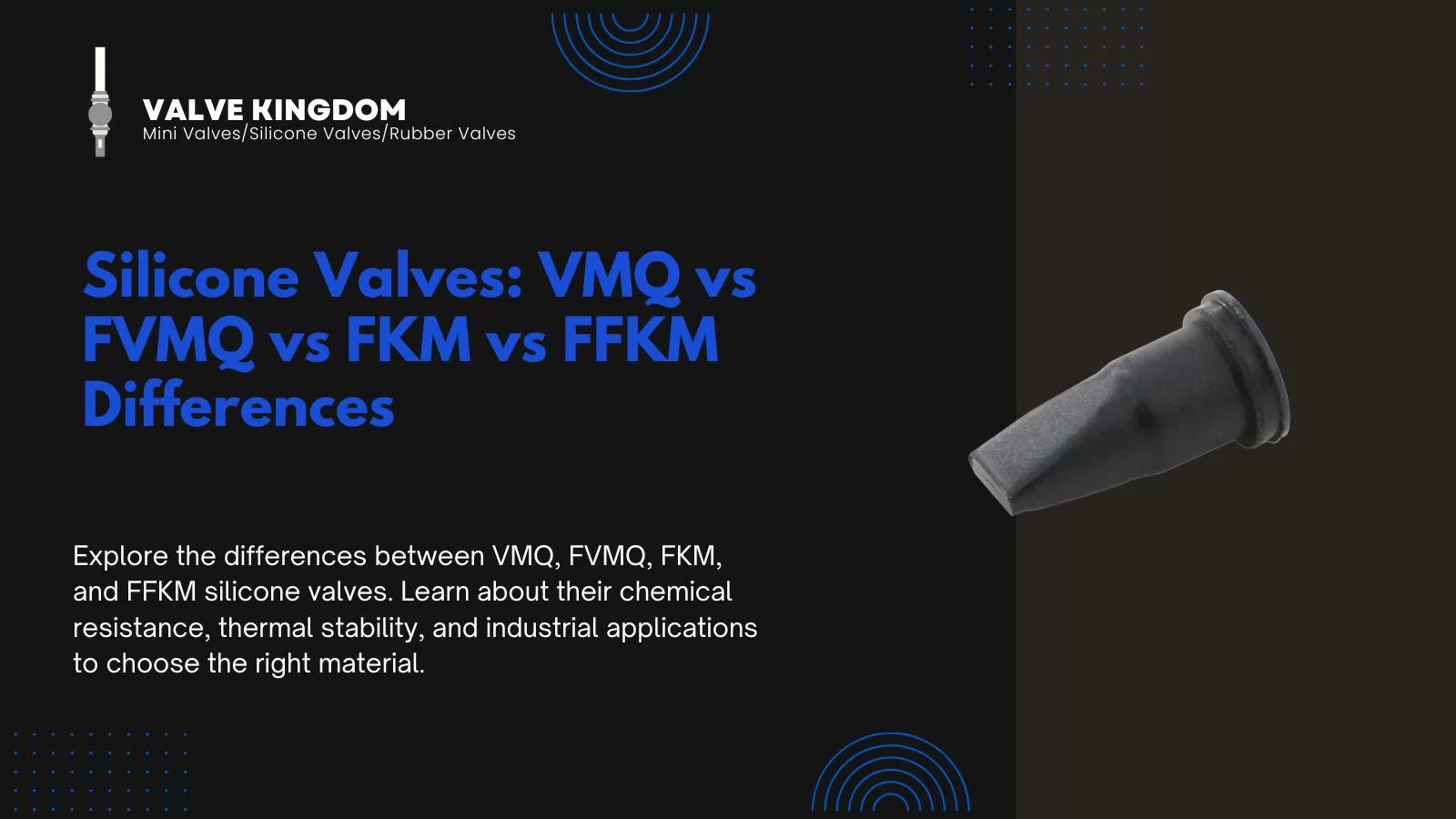
Choosing the right elastomer material for silicone valves can significantly impact the performance, longevity, and safety of your application. From standard VMQ to high-performance FFKM, understanding each compound’s unique properties is critical—especially in high-demand industries like pharmaceuticals, food processing, aerospace, and chemical manufacturing.
We Will Cover
- Beyond the Acronyms: What VMQ, FVMQ, FKM, and FFKM Really Mean
- Material Engineering: Molecular Traits That Matter
- Temperature Tolerance Showdown
- Chemical Resistance Matrix
- Real-World Applications & Industry Suitability
- Cost vs. Performance: Making Smart Trade-offs
- Conclusion: Matching Material to Mission
Beyond the Acronyms: What VMQ, FVMQ, FKM, and FFKM Really Mean
Each of these materials represents a different class of high-performance elastomers:
- VMQ (Silicone Rubber): General-purpose silicone with high flexibility and weather resistance.
- FVMQ (Fluorosilicone): Fluorinated variant of VMQ, offering improved chemical resistance.
- FKM (Fluorocarbon Rubber, e.g., Viton®): Non-silicone elastomer with excellent chemical and heat resistance.
- FFKM (Perfluoroelastomer): Premium-grade sealing material with near-universal chemical compatibility and extreme thermal endurance.
Material Engineering: Molecular Traits That Matter
At a molecular level, VMQ and FVMQ are both polysiloxanes, yet the fluorinated side chains of FVMQ enhance fuel and oil resistance. In contrast, FKM and FFKM are composed of carbon-fluorine backbones, resulting in inherently higher chemical inertness. FFKM, in particular, is almost chemically equivalent to PTFE (Teflon®), but offers elasticity that rigid polymers lack.
Temperature Tolerance Showdown
| Material | Operating Temperature Range | Thermal Stability |
|---|---|---|
| VMQ | -60°C to +200°C | Moderate |
| FVMQ | -55°C to +200°C | Moderate to High |
| FKM | -25°C to +250°C | High |
| FFKM | -15°C to +320°C | Extreme |
Chemical Resistance Matrix
When working with aggressive media—acids, fuels, solvents, or reactive gases—the wrong valve material can quickly fail. Below is a simplified overview:
- VMQ: Good for water, oxygen, some acids; poor with fuels or oils.
- FVMQ: Better resistance to fuels, solvents, and hydrocarbon oils than VMQ.
- FKM: Excellent resistance to aliphatic hydrocarbons, acids, and most fuels.
- FFKM: Nearly universal chemical compatibility, including strong oxidizers and hot acids.
Real-World Applications & Industry Suitability
Choosing the right elastomer for your valve application often depends on regulatory and environmental demands:
- VMQ: Common in food-grade and consumer appliances due to its clean profile.
- FVMQ: Ideal for aerospace fuel systems and automotive vapor control.
- FKM: Popular in chemical processing, vacuum systems, and oil refineries.
- FFKM: Essential in semiconductor, pharmaceutical, and ultra-pure systems requiring zero contamination risk.
Cost vs. Performance: Making Smart Trade-offs
Not every application demands the top-tier performance of FFKM. VMQ remains cost-effective for general-purpose use, while FKM offers a balanced price-to-performance ratio for chemically harsh environments. Think strategically:
- Use VMQ for low-cost, moderate-duty sealing needs.
- Choose FVMQ when moderate chemical resistance is essential without a large budget increase.
- Rely on FKM in chemically aggressive or high-heat scenarios.
- Reserve FFKM for mission-critical applications where failure is not an option.
Final Thought: Matching Material to Mission
Selecting the right silicone valve material isn’t just a technical decision—it’s a strategic one. Whether you’re designing systems for food processing, chemical containment, or aerospace fuel delivery, the differences between VMQ, FVMQ, FKM, and FFKM have real-world consequences. Understanding their distinctions helps you balance safety, cost, and durability—ensuring your valves perform under pressure, every time.
Need help sourcing high-performance valve materials or custom-molded parts? Contact our engineering team for consultation or explore our product range covering VMQ to FFKM grades.


